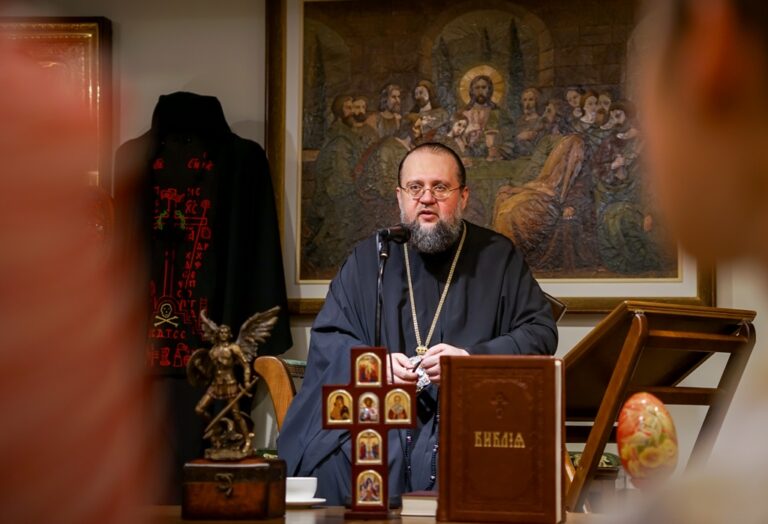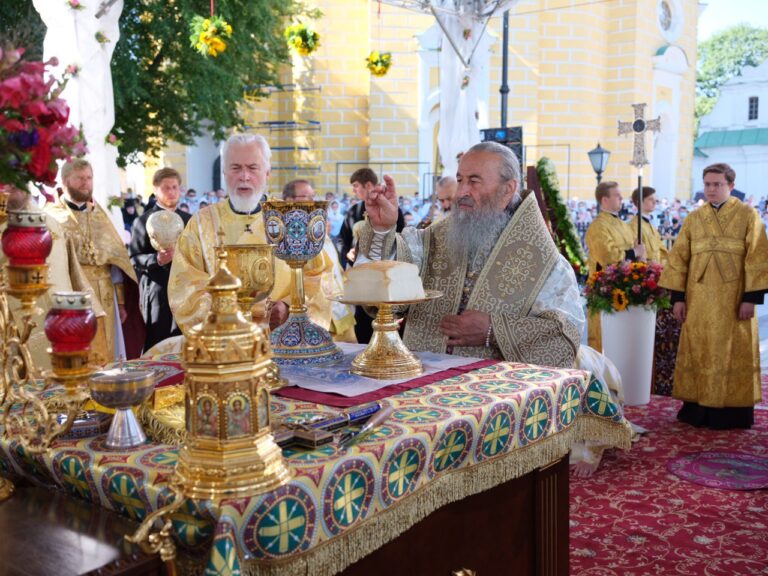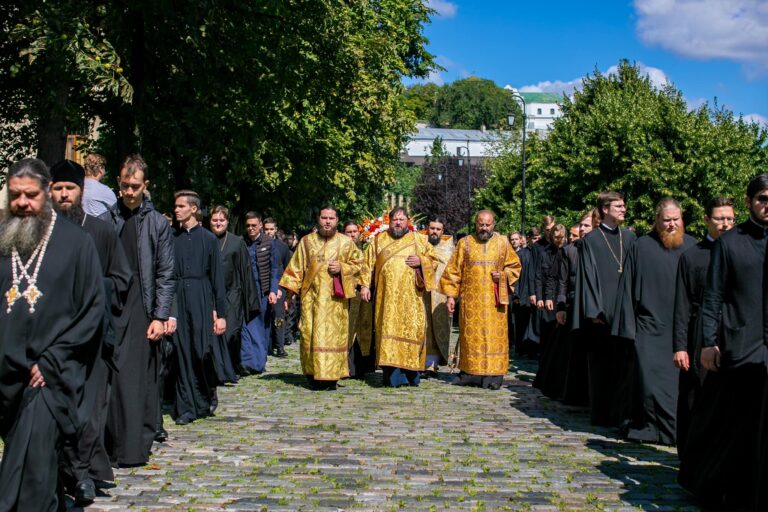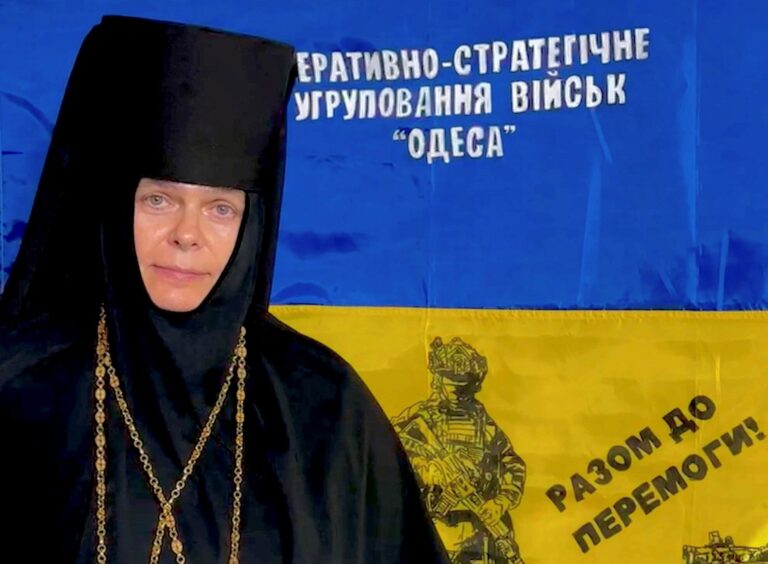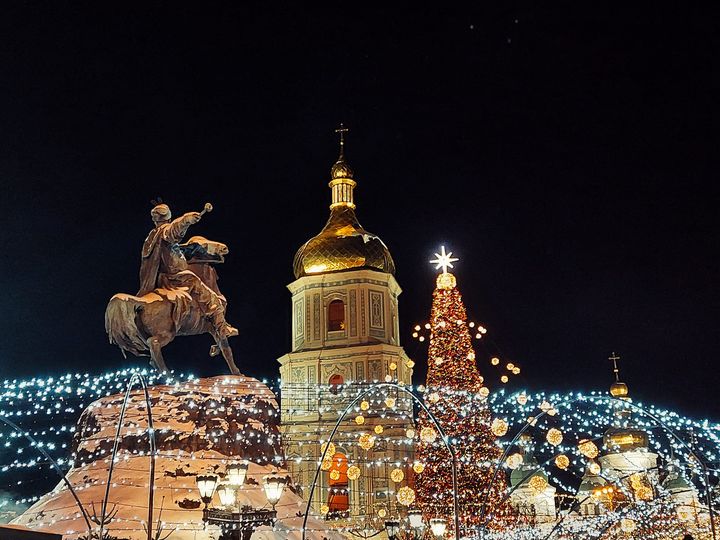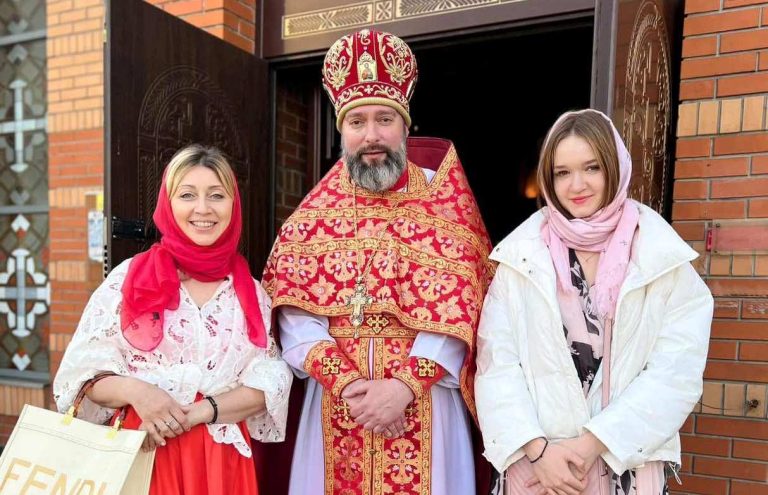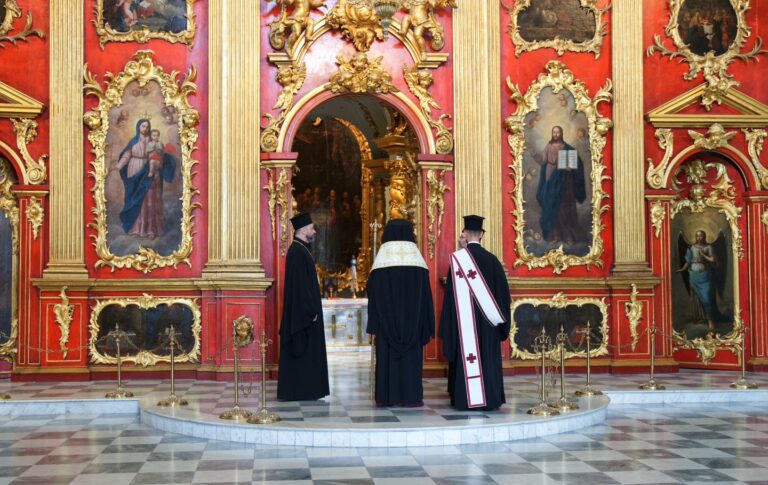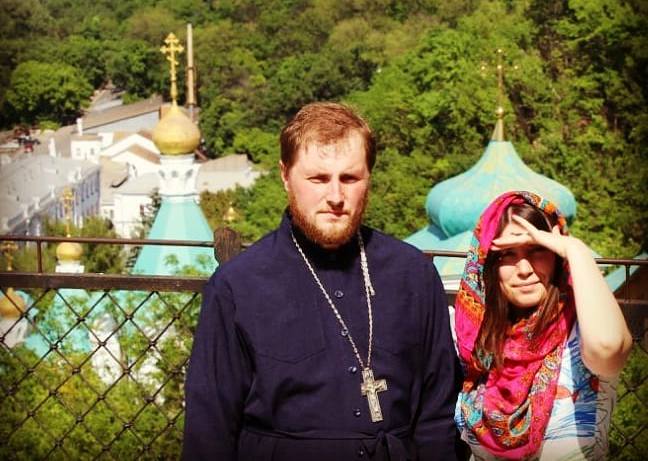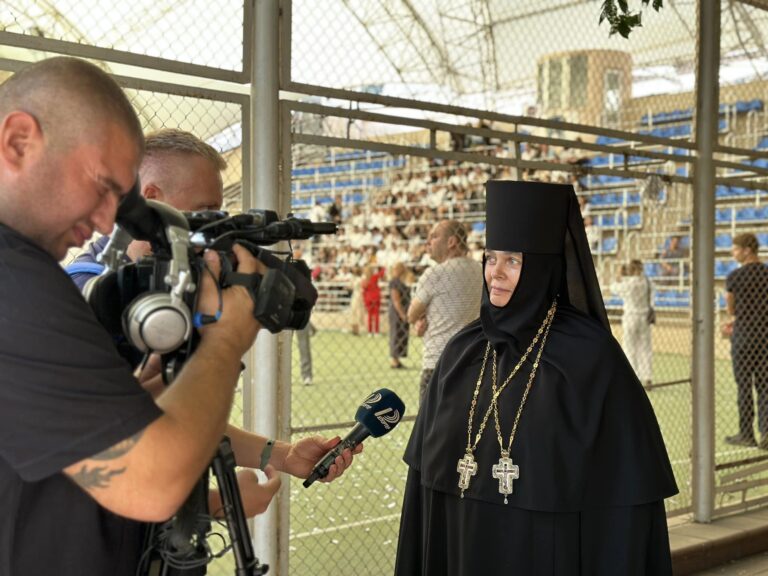“The Ukrainian Orthodox Church should determine the canonical status they wish to continue incorporating, first. The current status is non-canonical since the UOC has defined itself as ‘independent’ without having proclaimed itself as autocephalous; however, there is no such status in Orthodoxy”.
The main value of this conversation is that it frankly discusses the answers to the questions that have been causing pain to the UOC believers since the beginning of the full-scale Russian invasion. Are we with Moscow or not? Is the Council in Feofaniya a schism? Are we still a canonical church? What will happen if we declare autocephaly? And what if we don’t?
Today’s interlocutor of the Dialogue is Dr Anargiros Anapliotis, Assistant Professor of Orthodox Canon Law and German constitutional law of religions at the University of Munich. He publicly supports Ukraine in its confrontation with Russian aggression and professionally analyses the processes taking place in its religious field.
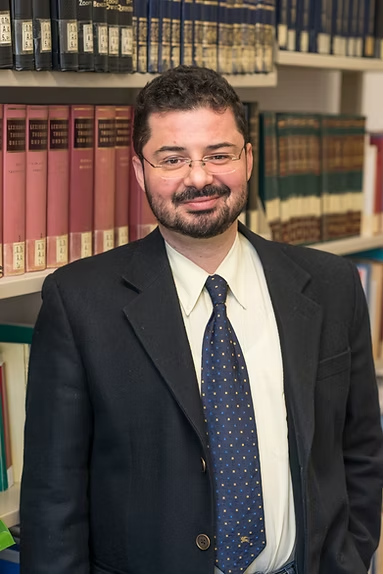
Why is this outsider’s view of the events in Ukrainian Orthodoxy important? The conversation makes it clear that the situation is very difficult, but not hopeless. There are ways out of the crisis. As always, it all depends on the concrete steps taken by individuals.
We hope this text will be useful for those on whom the future of our Church depends.
The Ukrainian translation is available at the link: https://dialogtut.online/mizh-konstantynopolem-i-moskvoyu-yak-mozhe-vyrishytysya-konflikt-ukrayinskogo-pravoslavya/
An ‘uncanonical church’ can be understood in various ways
— How can a complex phenomenon as canons be explained in simple words? Are canons like laws in a state? If one has not broken them, one is not guilty? Then what is, from the point of view of canon law, a ‘non-canonical Church’? Illegal? But who defines that and how?
— The matter is not very simple; therefore, a plain explanation should not be expected. In the Orthodox Canon Law three sources are recognised, each of which has a different meaning.
The most important and primary source is the Canon Law, which is binding for the entire Orthodox Church. It consists of individual canons – or ‘legal texts’ – issued directly either by Ecumenical or Local Councils, or written by individual Fathers of the Church and ratified at a later time by Ecumenical Councils. Since Ecumenical Councils are the highest bodies in the Church, their decisions are absolutely binding.
It should be noted, though, that opinions differ so far as the scope and the duration of the canons are concerned. For this reason, a distinction is often made between ‘divine law’ and ‘human law’ canons. ‘Divine law’ canons cannot be ignored under any circumstances, while ‘human law’ canons can be disregarded under certain circumstances.
Opinions also differ about the extent to which canons can be interpreted, changed, or even suspended; but it is generally accepted that canons ratified by Ecumenical Councils are binding as they form a part of the Church’s Holy Tradition. However, alongside the above, there is also the principle of ‘oikonomia’. Under this principle, deviation from the literal wording of a canon can be permitted only for the sake of saving souls (usually exercised in disciplinary matters), and it can never transgress dogmatic boundaries. Conversely, ‘akribeia’ dictates strict adherence to the canons.
Under the principle of ‘oikonomia’, if an individual violates a canon and is found guilty by a church or diocesan court, appropriate disciplinary measures can be taken; these usually consist of temporary exclusion from receiving communion (also known as minor excommunication). The exclusion can range from a few days to several years, while ‘anathema’ (major excommunication) can result in complete exclusion from the Church.
An ‘uncanonical church’ can be understood in various ways. It can be a schism (when a group splits from the Church without changing their faith), but it can also be a heretical group which have transgressed dogmatic boundaries.
For example, the so-called ‘Montenegrin Orthodox Church’, whose representatives have never been ordained as bishops, but they have just ‘ordained’ themselves; this is a violation of the first apostolic canon, which in no way can be justified by the principle of ‘oikonomia’. Therefore, this church is an uncanonical and heretical sect, even in case the degree of distance from Orthodoxy is to be assessed differently.
It should be stressed that the canonical rules of all Ecumenical Councils, many Local Synods, and some Church Fathers form an integral part of the sacred tradition of the Orthodox Church. In this respect, they are not only laws in the strict sense of the word, but they also belong to the dynamic history of salvation itself. And while the purpose of Secular Laws is the maintenance of justice and order in a civil society, the Canon Law of the Church must also take earnestly the words of our Saviour, “Unless your righteousness is far greater than that of the scribes and Pharisees, you will not enter the kingdom of heaven” (Mt 5:20) and, “The Sabbath is for man and not man for the Sabbath” (Mk 2:27), and apply them for the well-being of the children of God.
Under this prism, the Orthodox Church applies the canons for the benefit of the members as a loving mother who does not want to condemn but rather to forgive, and rejoices at the sincere repentance of the guilty one, as in the parable of the ‘prodigal son’. This is why the principle of ‘oikonomia’ is applied in the administration of justice, in an effort to follow Christ’s boundless love for every sinner.
As to the question on the current status of the UOC, one could speak of a canonically difficult situation, but not of a schism
— About our Ukrainian Orthodox Church, also after the Council in Theophany in May 2022, some people say that we are now a non-canonical Church. Is it true?
— The term ‘uncanonical churches’ is used to describe the communities of Orthodox Christians who lack full communication with the Orthodox Church, the one, holy, catholic, and apostolic church in which we believe. The reasons can vary and range from a lack of essential elements of church-being to non-recognition of a self-proclaimed autocephaly.
Such complicated questions used to be decided by Ecumenical Councils; however, the testimony of the four ancient patriarchates of the Pentarchy carries particular weight, among whom in the first place is the Ecumenical Patriarch of Constantinople, the New Rome. According to canon 36 of the Quinisext Council, his episcopal see has the same privileges as the first episcopal see of Ancient Rome, followed by the Patriarchs of Alexandria, Antioch, and Jerusalem.
As to the question on the current status of the UOC under Metropolitan Onufriy, it could be said that none of the above scenarios took place there and that their current status is canonically difficult to define as the Synod of Feofaniya which took place in 2022 unilaterally declared the independence of the UOC from the Moscow Patriarchate; moreover, they also suspended the commemoration of the Moscow Patriarch.
As this decision can be assumed to have been made under immense pressure from the Ukrainian authorities because of the Russian war, I believe that, concerning the ‘oikonomia’, one could speak of a canonically difficult situation, but not of a schism. Presumably, the canonical status of the UOС could only be fully clarified after the end of the war mentioned above, in a politically calm and stable situation. At this moment, one cannot speak of an uncanonical UOC for the simple reason that all local Orthodox Churches continue to maintain communion with the UOC, including the MP, continue to regard the UOC as part of the ROC, and have not introduced any disciplinary measures.
— Faithful people are afraid to break canonical unity with the Church mentioned above, even though it is based in the territory of the attacking country, and even though the Heads of it fully justify the aggression against Ukraine.
— On this question I would answer that, theologically speaking, the Patriarch of Moscow broke communion with the Ukrainian Orthodox Church by not defending the Fundamentals of the Social Concept of the Russian Orthodox Church of 2000 (III, 8) and by not trying to formalise political conflicts through these declared fundamentals in order not to bear the inevitable consequences by breaking their moral principles though denial of the existence of a people who form a part of their own body.
A marriage cannot be divorced if it no longer exists. If a spouse stalks the other spouse’s life, the innocent party is fully entitled to divorce the guilty one.
The canonical unity with Moscow should be considered dead
— Is there a procedure in Orthodoxy for breaking the canonical link? And how to do this? Has anyone in history acted in this way, and what were the consequences?
— The Ukrainian Orthodox Church should determine the canonical status it wishes to continue incorporating, first. The current status is non-canonical since the UOC has defined itself as ‘independent’ without having proclaimed itself as autocephalous; however, there is no such status in Orthodoxy. There are autocephalous and autonomous, but not ‘independent’ Churches, and this term is non-canonical. If a Church has not been proclaimed as autocephalous, then it remains ‘de jure’ part of another autocephalous Church. The Churches that have not broken canonical communication with UOC regard it as an integral autonomous part of the autocephalous Moscow Patriarchate. This is also the way ROC sees it.
In recent Church history, only the Ecumenical Patriarchate granted the autocephalous status to certain parts of it, or restored the status of autocephalous for some ancient Churches. In 1589, the status of autocephalous was granted to the Church of the Muscovite Tsardom; in the 19th century, to the Churches of three modern European national countries – Greece, Serbia, and Romania. In the 20th century, the autocephalous status was granted to the Churches of Albania, Poland, Georgia, the Czech Republic, and Slovakia, and, finally, in the 21st century, to the Church of Ukraine.
The autocephaly of the Church of Bulgaria, which was proclaimed unilaterally in 1872, was recognised by the Church of Constantinople in 1945; this meant that this Church was uncanonical for over seventy years.
In case the Ukrainian Orthodox Church sees itself as the successor of the historic Metropolis of Kiev of the Ecumenical Patriarchate (which existed for nearly 700 years), then they could receive their canonical autocephalous status only from the Patriarchate of Constantinople, which will be acting as their Mother Church. However, this is no longer possible after 2019, when OCU was proclaimed as autocephalous. The UOC can only become an autocephalous uniting itself with the OCU; this should not mean that they will be absorbed or annexed because the autocephalous was granted not only for formerly uncanonical Churches, but for all Orthodox Christians of your country.
— The Ukrainian Orthodox Church is reproached by the canonical unity with the Russian Orthodox Church. Is it necessary to cherish this canonical unity at all?
— As I have already explained, this canonical unity with Moscow should be considered dead; therefore, the UOC should endeavour to restore its canonical status within the world Orthodoxy as a whole. Since there is already a canonical autocephalous Orthodox Church of Ukraine in your country, the UOC can restore canonical unity with the Pleroma of Orthodoxy by uniting itself with the OCU.
The greatest victim of the Russian war against Ukraine is the UOC
— Can other Orthodox Churches help in our situation, when one Orthodox Church is practically being wiped off the face of the earth by the state, sometimes literally? Already, three churches of the UOC have been demolished by decision of the Ukrainian authorities, and hundreds of churches on top of that have been destroyed by Russian shelling. But apart from expressions of concern on the part of world Orthodoxy, we see no other reaction.
— You have just confirmed my opinion that the greatest victim of the Russian war against Ukraine is the UOC. The whole Orthodoxy suffers together from the war consequences, and we keep praying for an end to this tragedy.
I think that the autocephalous Churches would have reacted differently if Orthodoxy in Ukraine had not been divided and had addressed the rest of the world in one voice.
In Germany, the first thing the Orthodox Christians ask when they meet Orthodox Ukrainians is whether they belong to Epifaniy or Onufriy.
— Frankly speaking, we in Ukraine partly feel ourselves hostages of two opposing Orthodox centres: Moscow appeals to the theme of protection of the UOC when it is necessary to justify the Russian invasion, and Constantinople declares that the territory of Ukraine is now its canonical field and imposes its orders. That is, it is as if we cannot solve our issues inside Ukraine, but interference from outside leads to even worse consequences. What can be the optimal solution to this issue from the point of view of world Orthodoxy?
— Unfortunately, the world Orthodoxy is still divided on the issue of the Ukrainian Church. On the one hand, there is the Moscow Patriarchate that has repeatedly declared it will not accept an autocephalous status of the Ukrainian Church under any circumstances, thus blocking the unity of Ukrainian Orthodoxy. On the other hand, there is the Ecumenical Patriarchate and three other important and ancient autocephalous Churches that have already recognised the autocephalous status of the OCU. However, most of the other autocephalous Churches are still waiting to see how ecclesiastical events will develop within Ukraine. But it should be noted that not a single Orthodox Church has broken up communion with the Ecumenical Patriarchate following the founding of the OCU.
It is believed that the best solution for the world Orthodoxy is this that will lead to the unity of all Orthodox Ukrainians in only one Orthodox Church, canonical and autocephalous to embrace all Orthodox Ukrainians and make them realise that only they can end this schism that troubles their country; the world Orthodoxy can only support them in doing so. Through sincere dialogue without preconditions, with a clearly defined goal – that of a united Ukrainian Orthodox Church, canonical and autocephalous – things can come to the desired higher goal.
At present, it is only possible to ascertain that the canonical situation of the Ukrainian Orthodoxy needs clarification. The reason is that many questions arise, and each one has to be examined separately.
The fact that Ukraine has been standing up to the Russian invasion for more than three years now tells the whole world of the great strength and determination of the Ukrainian people. Ukraine is the second-largest Orthodox country, and the current weakness of your Church lies in your ecclesiastical division. If there were only one united Church in Ukraine, then the Ecumenical Patriarchate and consequently all the other Orthodox Churches would recognise this Church as autocephalous or as a Patriarchate. The Ecumenical Patriarchate has paved the way towards unity and has done everything in its power to establish a canonical autocephalous status in Ukraine; it is up to all Orthodox Ukrainians now to end this division once and for all.
Dialogue should be based on the grounds of Christian affection and be free from all the hostilities of the past. The OCU should re-examine the apostolic succession of every single cleric within their ranks and, if necessary, remediate it, while the UOC should put their relations with Moscow on hold, foster their intention for full independence, and support the status of autocephalous. Canonically speaking, this is the only viable solution that will be fraternally accepted and welcomed by the majority of the world’s Orthodoxy.
It becomes more obvious day by day that a pan-Orthodox convention would enable the finding of a viable solution to a merger as the one in question, while, in the meantime, the Ukrainians should strive to resolve their ecclesiastic issues within the borders of their own country. No matter how difficult it may sound, the achievement of such an inter-Ukrainian consensus on clerical and jurisdiction matters is considered fundamental for solving the dichotomy that is currently troubling the whole country and its faithful.
— Based on your answers, we see that the situation in Ukrainian Orthodoxy is not hopeless. Much depends on mutual steps towards it. But, as faithful of the UOC, we must say that currently the dialogue between the Orthodox of the two Churches is hindered by the forcible seizure of our churches by representatives of the OCU and the illegal re-registration of communities. If it were not for these actions, perhaps the process of mutual rapprochement would have gradually taken place. How, in your opinion, can this situation be corrected? What steps should be taken?
— Unfortunately, I don’t know exactly the situation and the State laws in Ukraine. The Churches can only be brought together when all sides act within the framework of Christian love and the commandments of the gospel of Christ. Only this can be the basis of unity, within the
framework of the legislation of a European democratic state that respects religious freedom.




